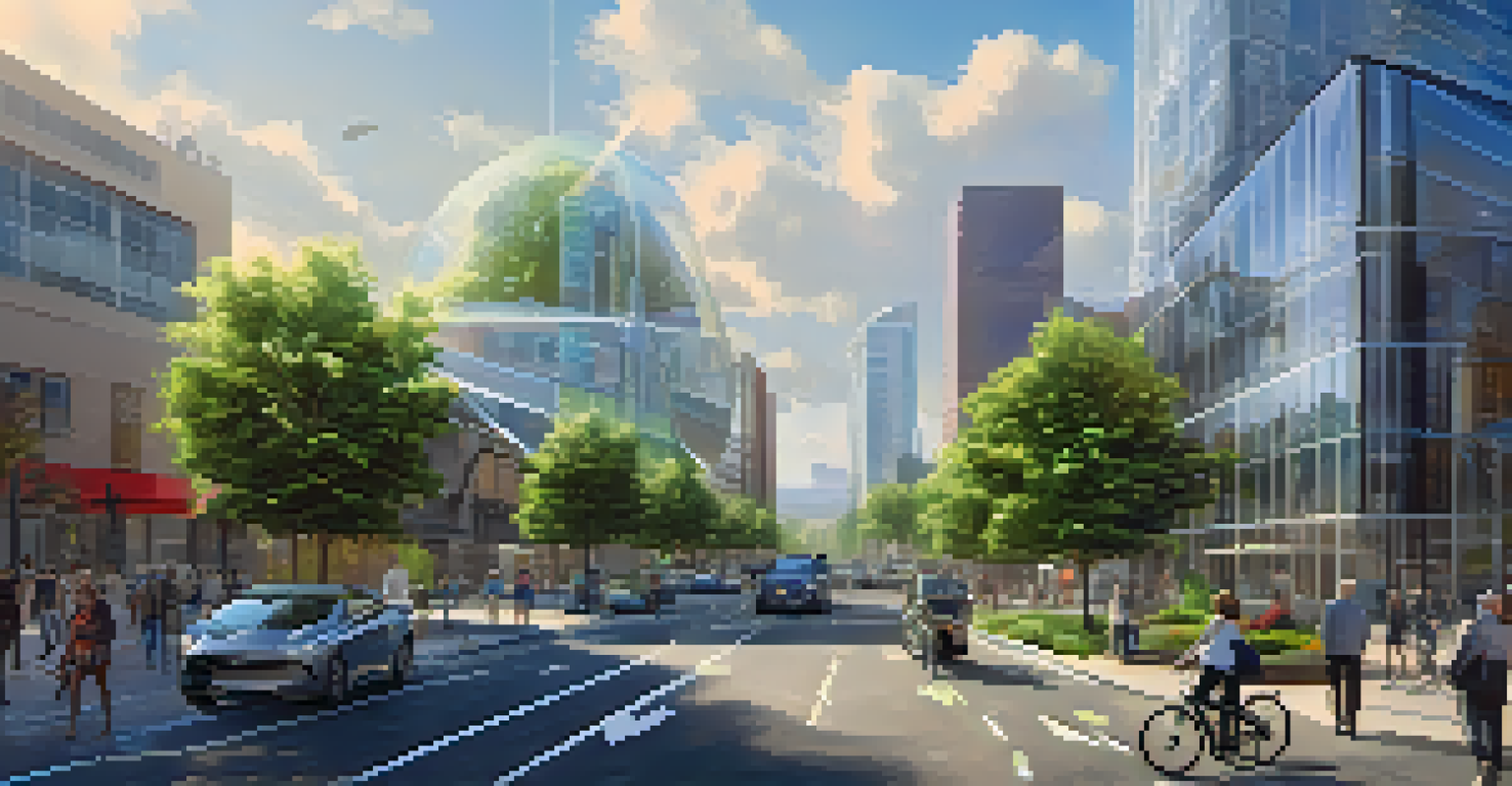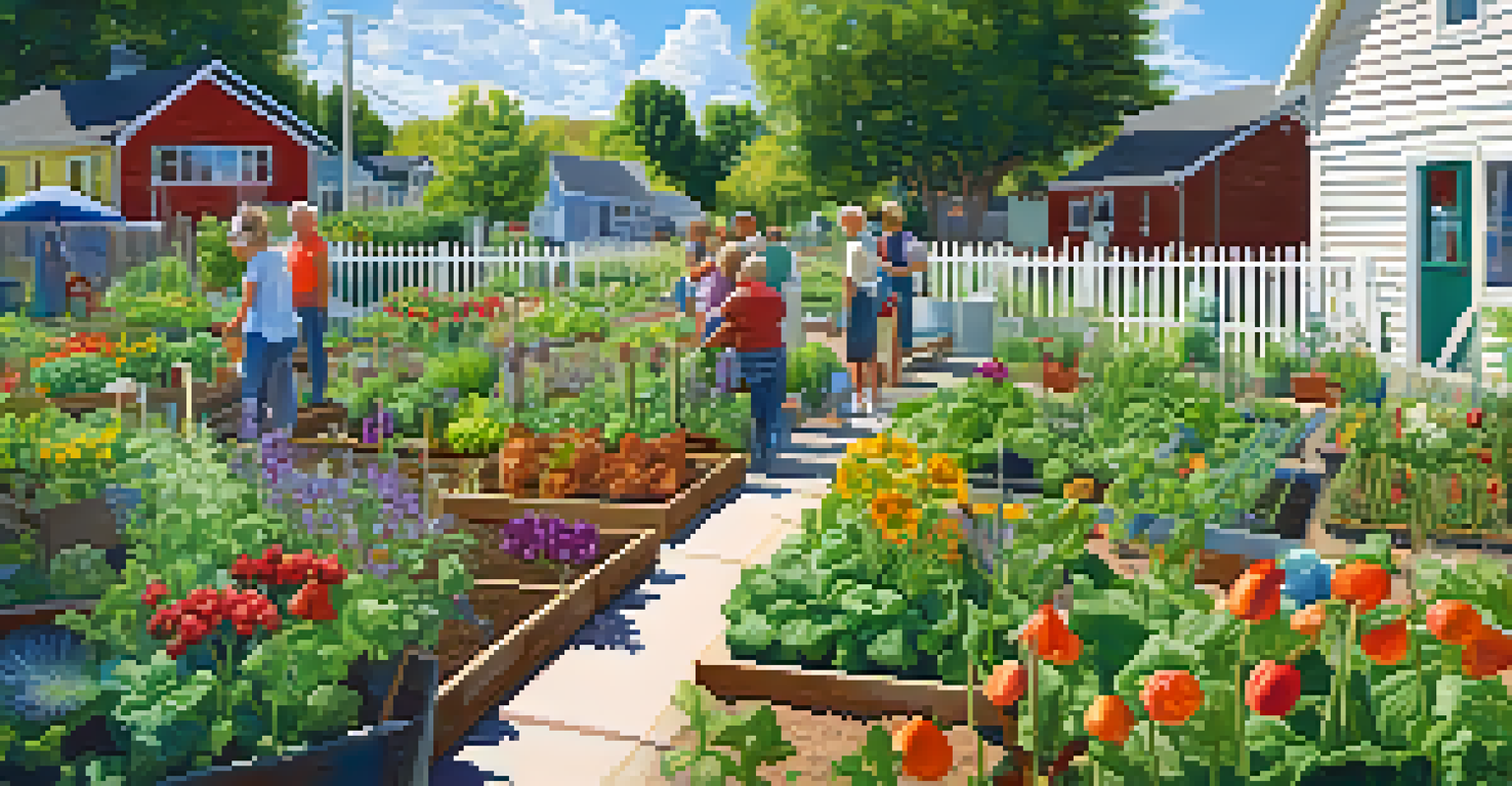Sustainable Urban Development Trends in Colorado Cities

The Rise of Eco-Friendly Building Practices
In recent years, Colorado cities have embraced eco-friendly building practices, showcasing a commitment to sustainability. This shift includes the use of sustainable materials, energy-efficient designs, and innovative technologies that reduce environmental impact. For example, many new constructions in Denver now meet the LEED (Leadership in Energy and Environmental Design) certification standards, ensuring they are built with the planet in mind.
Sustainability is no longer about doing less harm. It's about doing more good.
Moreover, local governments are incentivizing developers to adopt green building techniques by offering tax breaks and grants. This not only promotes a healthier environment but also attracts eco-conscious residents and businesses. As the trend continues, we can expect to see more architects and builders prioritizing sustainability in their projects, making eco-friendly living a standard rather than an exception.
Ultimately, these practices not only help the environment but also enhance the quality of life for residents. With improved air quality and reduced utility costs, the benefits of eco-friendly buildings extend far beyond the construction phase.
Smart City Technology for Sustainable Urban Life
Many Colorado cities are integrating smart technology to enhance urban living while promoting sustainability. This includes smart sensors for monitoring traffic, energy usage, and even waste management, allowing cities to operate more efficiently. For instance, Boulder has implemented smart waste bins that notify collection services when they're full, optimizing waste collection routes and reducing greenhouse gas emissions.

Additionally, smart grids are becoming more prevalent, enabling cities to manage energy distribution effectively. These technologies allow for better demand response, reducing energy consumption during peak hours and leading to lower energy bills for residents. By marrying technology with urban development, Colorado cities are not just improving infrastructure but also fostering a more sustainable lifestyle.
Eco-Friendly Building Practices Rise
Colorado cities are increasingly adopting eco-friendly building practices to promote sustainability and enhance residents' quality of life.
As these smart technologies evolve, they will continue to play a crucial role in addressing urban challenges such as traffic congestion, pollution, and energy waste. The future of urban living in Colorado looks bright as cities embrace innovation for a more sustainable tomorrow.
Increased Green Spaces in Urban Areas
The importance of green spaces in urban areas is gaining recognition across Colorado cities, with many initiatives aimed at enhancing biodiversity and improving residents' well-being. Parks, community gardens, and green roofs are becoming staples in urban planning, providing a much-needed respite from the concrete jungle. For example, the city of Fort Collins has committed to increasing its park space, promoting outdoor activities and community engagement.
The greatest threat to our planet is the belief that someone else will save it.
These green spaces not only serve as recreational areas but also contribute to environmental sustainability by improving air quality and supporting local wildlife. They act as urban lungs, absorbing carbon dioxide and releasing oxygen, which is essential in combating climate change. Moreover, studies show that access to nature can reduce stress and increase overall happiness.
As Colorado continues to grow, the push for more green spaces will likely remain a priority for city planners. By fostering a connection between residents and nature, cities can create healthier, happier communities that thrive both environmentally and socially.
Transportation Innovations for Sustainable Mobility
Sustainable urban development in Colorado is also marked by innovative transportation solutions aimed at reducing reliance on cars. Cities like Denver and Boulder are investing in public transit, bike-sharing programs, and pedestrian-friendly infrastructure to promote alternative modes of transportation. The expansion of light rail and bus rapid transit systems not only improves mobility but also reduces traffic congestion and pollution.
Furthermore, electric vehicle (EV) charging stations are becoming more common throughout urban centers, encouraging the adoption of greener cars. With the increasing popularity of EVs, cities are working to ensure that charging infrastructure is accessible and widespread. This initiative aligns with Colorado’s ambitious goal to reduce greenhouse gas emissions from transportation.
Smart Tech Enhances Urban Sustainability
The integration of smart technology in Colorado cities is optimizing urban living by improving efficiency and promoting sustainable practices.
These transportation innovations are essential for creating a sustainable urban environment. By prioritizing public transit and clean energy options, Colorado cities are making strides towards a future where mobility is efficient, eco-friendly, and accessible to all residents.
Community Involvement in Sustainable Initiatives
A significant trend in sustainable urban development is the rising emphasis on community involvement and empowerment. Colorado cities are increasingly engaging residents in the decision-making processes related to urban planning and sustainability initiatives. Community workshops, surveys, and public forums allow citizens to voice their needs and ideas, fostering a sense of ownership.
This participatory approach not only enhances transparency but also leads to more effective and relevant solutions tailored to local contexts. Local organizations, such as neighborhood associations, are often at the forefront of promoting sustainability initiatives, whether it’s through community gardens or local recycling programs. This grassroots involvement has proven to be crucial for the success of sustainability efforts.
As more residents become engaged in these initiatives, the ripple effect can lead to stronger community ties and a collective commitment to sustainable living. By working together, communities in Colorado can create a brighter, more sustainable future for all.
Water Conservation Efforts in Urban Development
Water conservation is a pressing issue in Colorado, especially given the state’s arid climate. As urban areas expand, cities are implementing innovative strategies to manage water usage effectively. This includes the adoption of xeriscaping, which involves landscaping that reduces or eliminates the need for irrigation, making it a popular choice for new developments.
Additionally, cities are investing in green infrastructure, such as rain gardens and permeable pavements, to manage stormwater runoff sustainably. These features not only help recharge groundwater but also reduce the burden on stormwater systems during heavy rains. By prioritizing water conservation in urban planning, Colorado cities are not only protecting this precious resource but also enhancing the resilience of their communities.
Community Engagement Drives Change
Active community involvement in urban planning is crucial for the success of sustainability initiatives across Colorado.
With ongoing education and community involvement in conservation practices, residents can contribute to these efforts. Through simple changes like using drought-resistant plants or collecting rainwater for gardening, individuals can play a significant role in promoting sustainability at a local level.
Promoting Renewable Energy in Urban Development
Renewable energy is at the forefront of sustainable urban development in Colorado cities, with a growing emphasis on solar and wind energy sources. Many local governments are implementing policies that encourage the installation of solar panels on residential and commercial buildings, making clean energy more accessible. For example, Colorado Springs has launched programs to subsidize solar energy installations, promoting a shift towards greener energy sources.
Moreover, city planners are integrating renewable energy solutions in new developments, ensuring that sustainability is built into the very fabric of urban living. By investing in renewable energy infrastructure, cities not only reduce their carbon footprints but also create jobs and stimulate local economies. This transition is crucial for achieving Colorado’s ambitious renewable energy goals.

As awareness of the benefits of renewable energy grows, residents are more likely to support and participate in these initiatives. Empowering citizens to embrace renewable energy through education and incentives will be vital for building a sustainable future in Colorado’s urban landscapes.
Future Outlook for Sustainable Urban Development in Colorado
Looking ahead, the future of sustainable urban development in Colorado appears promising, with cities committed to continued innovation and improvement. As urban populations grow, the need for sustainable practices will only intensify, prompting cities to adapt and evolve. The integration of advanced technologies, community engagement, and eco-friendly practices will be essential in shaping the urban landscape.
Furthermore, the collaboration between governmental bodies, private sectors, and local communities will be crucial for driving sustainable initiatives forward. By sharing resources and knowledge, stakeholders can create a cohesive approach to urban development that prioritizes sustainability. This collective effort will not only enhance the quality of life for residents but also position Colorado as a leader in sustainable urban practices.
Ultimately, as more cities in Colorado embrace sustainability, the potential for positive change becomes limitless. By prioritizing eco-friendly initiatives and community involvement, the state is paving the way for a brighter, greener future for urban living.